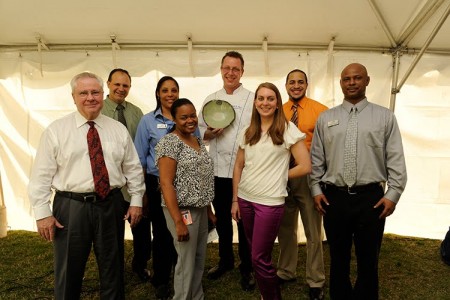Follow Us

Emil Topel (fifth from left) with members of Chartwell’s staff.
Emil Topel — Staff
Chartwell’s, Auburn, AL
Emil Topel, Senior Executive Chef with Chartwells – the operator of Tiger Dining, has likely done more than any single individual on campus to include sustainability considerations into the food served on campus, and how the main dining areas operate.
In collaboration with a dedicated team, Emil brought local, organic, and healthier food options to campus dining, reduced waste, re-used and recycled materials, donated surplus food to Campus Kitchens to create meals for the underprivileged, and creatively informed and engaged campus diners about more sustainable choices. Emil has shown a spirit of sustainability by working toward a dining service that provides healthy food for people and acts responsibly toward the natural systems that sustain us.
As a result of Emil’s commitment and leadership, various campus venues proudly display signs indicating local and organic options. Tiger Dining now serves Auburn-grown chickens, eggs, shrimp, and catfish. Emil and his staff work to stock salad bars with as much local, organic, and sustainable produce as available. Emil recently switched to buying Blue Bell ice cream because it is produced closer to Auburn than other comparable brands. Additionally, some food containers are made from post-recycled content manufactured just down the road in Montgomery, Alabama.
Emil’s actions have a ripple effect beyond the benefits to the consumers on Auburn’s campus who he helps feed. As Emil incorporates sustainable options into Tiger Dining, the vendors he works with and other campuses see the demand for these practices, and how they can work at the scale of a campus that feeds thousands of people daily.
Emil has shown commitment to sustainability by going the extra mile to listen to the desires and concerns of the campus community, collaborate, and take action. The “Love Food, Not Waste/Real Silverware” program is an excellent example. Emil meets regularly with student organizations, including the Auburn Real Food Challenge, and acted on the students’ request to provide metal silverware at main dining locations to reduce the amount of plasticware sent to landfills.
Emil was willing to challenge the assumption that disposables are less expensive, and made some initial calculations that suggested the durable silverware could be less expensive even including the higher initial purchase cost, washing, inventory, and maintenance. In the first two months of the program, campus diners used the real silverware more than 30,000 times. Through a continued collaboration with the Auburn Real Food Challenge and Auburn Office of Sustainability, regular silverware inventories continue to add to the data showing that the program can be more sustainable from both an economic and resource perspective.
Emil’s enthusiasm and openness to working with others has created a fertile ground for ideas to sprout and grow. His commitment is genuine, and he truly embodies the Auburn Spirit of Sustainability.




